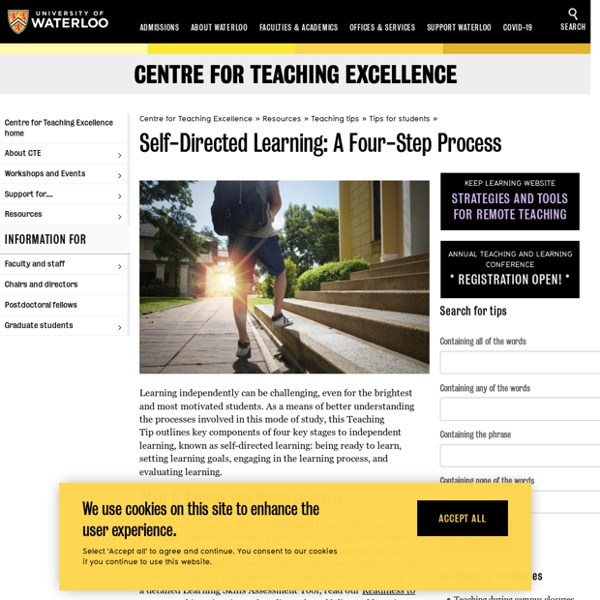



Differentiation – For the Teachers Differentiation is adjusting and modifying what skills and concepts students learn, what materials they use, and/or how their learning is assessed based on the needs of the students. Our students are not all the same, so we cannot expect that teaching a lesson in one way will reach every student. Our students are unique individuals with their own prior learning and their own learning preferences. An effective teacher makes the changes needed to reach every student where they are and to guide them to an understanding of the skills and concepts we want them to learn. Designing a Course Begin the process early, giving yourself as much time as you can to plan a new course. Successful courses require careful planning and continual revision. Consult with colleagues who have taught the same or similar courses to learn from their strategies and their general impressions of the students who typically take the course. If you are team-teaching, you and your teaching partner(s) should begin meeting well in advance to discuss course goals, teaching philosophies, course content, teaching methods, and course policies, as well as specific responsibilities for each instructor. Define course goals.
How to Help Middle and High School Students Focus on What They’re Learning, Not the Grade Remote and blended instruction have forced an unprecedented review of teaching and learning practices. The result: an increased awareness of what works and what doesn’t and a renewed interest in what learning looks like and how we assess it. The Assessment Trap St. Augustine's Principles of Teaching Around 400 A.D., a deacon from Carthage named Deogratias asked St. Augustine, then Bishop of Hippo in North Africa, for his advice on how to teach the faith to those who came seeking to become Christians. Other Christians often sent catechumens (new Christians learning about the faith) to this particular deacon because he was known to be well-versed in the faith and had the gift of eloquence. However, deacon Deogratias had doubts as to his own knowledge and manner of teaching.
Global Connections for Teachers and Students - We believe that connecting students with other students living in different parts of the world to share, learn and collaborate is a necessary part of any modern classroom program. We are often asked where we go to find global learning partners for our students, so we have shared the resources and communities we use, along with some tips about how you can connect your students with other classes and around the world. Founded in 2016, Belouga was started with the mission to encourage intercultural communication to create a better tomorrow. Belouga is a global ecosystem connecting classes throughout the world where students and teachers can connect, collaborate and learn from one another by identifying similarities and embracing differences through everyday communication that is fun and educational.
How to Use a Textbook for Deeper Learning: A lesson for our times I always used textbooks in my classes … but never how they were intended. They were valuable for me, as the teacher, to identify the important ideas in whatever subject I was teaching. We didn’t have state standards then, so I relied on the wisdom of the experts to break big topics (Ancient History, Simple Machines, Colonial Life, Force and Motion, Grammar) into teachable chunks. The table of contents provided a map for the specific topics we would explore. Students in my classes used textbooks the way they might use a dictionary or encyclopedia. (We didn’t have the Internet then either.)
STEM/STEAM: Science, Technology, Engineering, Math and the Arts STEM/STEAM: Science, Technology, Engineering, Math and the Arts Here you'll find articles and resources for STEM+Arts education, also known as STEAM. Topics include science, technology, engineering, math and arts education and range from research reports to feature articles to profiles of makerspaces to news about new STEAM and STEAM initiatives in schools. adler Essay How to Mark a Book By Mortimer J. 100 Things Students Can Create To Demonstrate What They Know 100 Things Students Can Create To Demonstrate What They Know contributed by Ryan Schaaf, Notre Dame of Maryland University When I was a high school student, I had the privilege of having a wonderful English teacher. Why Settle for Merely Reading a Book When You Can Master It? How to Read Less More, and Twice as Fast If you're like me, you really want to read more effectively, but you don't know how and can't find the time. Solomon wrote, "The writing of many books is endless, and excessive devotion to books is wearying to the body
Building Relationships Through the Use of Technology – George Couros This graphic above that I created with Bill Ferriter is something that I hope sparks conversations, but also stories of how these things are already happening in schools. I am going to use it as a guide to show how technology can enhance, amplify, and accelerate leadership. I encourage others to share their stories from one of the “better answers” above. Building Relationships As I was at an admin meeting as a principal, and listening to something that really had nothing to do with the my own school or building, I remember usually using this time to catch up on email. Since I had to stay at the meeting, I thought that I would use this time in a valuable way.